Summary 
Bare-bones indoor production by a talented ensemble of twelve brings the romantic tragedy to life. Played with vigor and humor, directed with clarity and precision, and aided by some gender-bent casting and a great deal of chemistry between the young stars.
Design
Directed by Jim Warren. Costume design by Erin M. West. Fight direction by Benjamin Curns.
Cast
John Innerst (Prince), Gregory Jon Phelps (Mercutio/Balthasar), Tim Sailer (Paris), Tracie Thomason (Juliet/Balthazar), Rene Thornton Jr. (Capulet), Lee Fitzpatrick (Lady Capulet), Dylan Paul (Romeo/Abram), Benjamin Curns (Montague/Chorus), John Harrell (Tybalt/Friar John), Emily Brown (Lady Montague/Apothecary), Chris Johnston (Benvolio), Allison Glenzer (Friar Lawrence).
Analysis
Jim Warren directs the first fall season performance of Romeo and Juliet at the American Shakespeare Center's indoor Blackfriars Playhouse. The energetic cast of twelve provides a half hour of singing and music from the musicians' gallery above the stage, effortlessly blending an entertaining mish-mash of hard rock like Aerosmith's "Walk This Way" - "so I took a big chance at the high school dance" - and Ratt's "Round and Round" - "I knew right from the start you'd put an arrow through my heart" - with its finger-snapping big finish, to classic rock like Eddie Money's "Two Tickets to Paradise" with a terrific horn solo and Journey's "Don't Stop Believin'": "she took the midnight train going anywhere." The musicianship is a treat and the singing is spirited, each of the songs reflecting on the play. The cast sets an Italian love story mood with a salsa-style "Mambo Italiano" a la Dean Martin - "hey Mambo!" - and another big horn solo, but the younger audience shows more appreciation for newer songs like the Jonas Brothers' "I Wanna Be Like You" and especially Ke$ha's "Die Young": "let's make the most of the night like we're gonna die young."
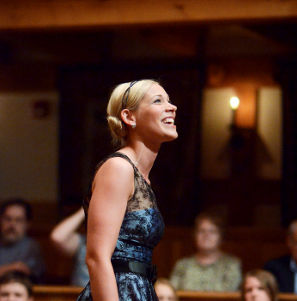
Warren modernizes the love story, Juliet wearing black jeans and Converse sneakers along with her Capulet royal blue, while the black-vested Romeo and his fellow Montagues are signified by reddish-rust garments. Lord and Lady Capulet provide the usual ASC fun facts - no lighting effects, interaction with the audience, live music - amid a Ten Rules for Dating My Daughter introduction, followed by a wild-eyed Chorus in a flashy white suit touched with Montague red. Warren's terrific ensemble interacts with the audience often in the first act and almost not at all during the far more seriously-toned second half. Sometimes they address the first few rows of the audience or the patrons in the slightly elevated and railinged lords' chairs, but usually they interact with the people seated in the gallants' stools, right onstage, six per side. The females in the audience garner the most attention, like Gregory exchanging flirty glances with a young lady 1.1, pushing her boyfriend aside to kneel next to her, then pointing her out - "show me a mistress who is passing fair" - with particular enthusiasm, or Mercutio 1.4 on bended knee, begging for a kiss and receiving a peck on the cheek, then waving to another young lady on the opposite side before pointing out "a slut" up in the general admission balcony. Other moments have similar involving impact, like an illiterate servant 1.2 asking for audience help reading names on Capulet invitations, the Friar offering a sniff of a cut rose to the front row 2.3, or the Nurse fanning her underarms by the Gallants' Stools 2.4.
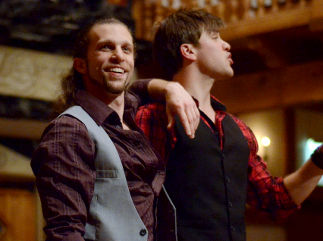
Warren makes some bold casting choices from the start, with the performers who play Romeo and Juliet taking the stage as brass-knuckles Abram and Balthazar in a baseball cap, embroiled in a violent brawl between the two families. Even more daring, he bends gender and casts burly actor Benjamin Curns as the Nurse and the gregarious Allison Glenzer as Friar Lawrence, both with great success. The tall and dark-haired Tybalt inflames the 1.1 brawl, and even the parents appear, the Montagues downstage right and the Capulets upstage left, but it takes an air horn from the Prince's entourage for the fighting to stop. All kneel in silence and drop their weapons in deference to the Prince in the balcony above, and after Lady Capulet wraps Benvolio's injured forearm - he wears black jeans with a chain belt, a red vest, and Converse sneakers - Dylan Paul's moonstruck Romeo wanders in from stage left. Boyishly handsome, Paul edges his Romeo with a droll wit - "teach me how I should forget to think" - that exceeds his turn in the same role at the Illinois Shakespeare Festival in 2011. He slaps meanly at Benvolio's injury 1.1 but is helpful with the illiterate servant, who pockets the invitations where he can remember the recipient, taking the last one between his teeth. Romeo interacts well with Mercutio and Benvolio, certainly one of the boys as they practice dance moves then don super-hero masks for the Capulet ball - Romeo is Captain America, Mercutio Iron Man, and Benvolio the Incredible Hulk - and they huddle to bump fists then rush upstage to spontaneous applause. After the masque they struggle 2.4 with hangovers - Mercutio fails to open a bottle of aspirin and Benvolio helps, muttering "there you go" - before Mercutio taunts Romeo, apparently struck by "the blind bow-boy's butt shaft," and Mercutio hisses his "s" and pops his "p" in "giving us the slip." They act like boxers, putting up their dukes and dancing around each other in a pretend ring, and Benvolio must halt Mercutio - "bone jour" - from becoming too amorous with a firm, "stop there; stop there."
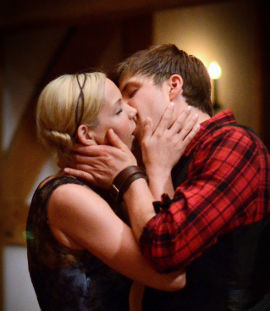
Tracie Thomason's performance is a highlight of the show, her Juliet smart and elegant, a radiant smile almost always on her face. During the 1.5 masque, she joins a line dance with her family but leads the way in a rock-n-roll clap-along dance to "Do You Love Me?" Paris exhibits some break dance moves, another dancer staggers to rest in the lap of an audience member on a Gallant's Stool, and Paul's Romeo stands in downstage awe of Thomason's Juliet, remarking quietly to an audience member, "she doth teach the torches to burn bright." Thomason's Juliet presents an endearing mix of civilized propriety with teenaged passion as she demurely pulls her hand from Romeo when he tries to kiss it. After their first kiss - "give me my sin again" - they kiss once more, and she gives him an equally demure "you kiss by the book" before launching hungrily at him to kiss him on the mouth while cradling his face in her hands.
Warren's 2.2 balcony scene also provides glimpses into the bursting joy of first love, with Paul's athletic Romeo balanced atop the wooden rail by the lords' chairs, straining for a closer look at Juliet, then running along the rail itself to drop into the audience and sprint to the opposite side of the stage as Thomason's Juliet sighs in the balcony, looking up to the heavens. After she speaks, Paul gasps "speak again!" then turns to a young lady in a gallant's stool for encouragement - nodding, "right!" - and when he speaks to Juliet, Thomason yelps and falls, hiding but cutely peering out between the balcony rails. Paul's Romeo then leaps to the stage, somersaulting to his feet - "Lady!" - and her innocent confusion - "what satisfaction canst thou have tonight?" - plays as naïve and romantic without being cloying. Thomason's Juliet gives an amusingly guttural growl-shout at the Nurse - "anon!" - before returning to sweet form, longing for Romeo to return ("I forgot why I called thee back") then in revelatory awe at "parting is such sweet sorrow." Her elated 3.2 appearance is especially heartbreaking on the heels of the murderous duels, as she twirls from the upstage curtain - "come gentle night" - and drops to her knees, then crawls to radiantly beam at the front row. When the Nurse tells her of Tybalt's death and condemns Romeo, Juliet's rebuke is so ferocious - "blister'd be thy tongue!" - that the audience seems hushed in shocked silence, but Thomason's Juliet sinks to her knees before collapsing in the arms of the Nurse.
Benjamin Curns, so memorable as the Bastard in last season's King John at ASC, makes a compelling Nurse in a twisted-gender master-stroke from Warren. Curns is expressive and matronly, much more a grand character than a comical conceit, a deep-voiced manly Nurse with a buxom bust and curly gray wig, wearing a spinster-blue frilly house-dress. During 1.3 he dispenses self-serving compliments - "thou hadst suck'd wisdom from thy teat" - with a snort, then makes himself laugh so hard - "women grow by men" - that he honks and excuses himself before slapping Juliet on her bottom as she passes. Curns's Nurse gives a low-pitched snarl at Peter in 2.5 - "stay at the gate!" - that nearly brings down the house, and after he stuffs a bill from Romeo into his bra, he pats Romeo on the shoulder, giving an appreciative nod at his muscle, then growling out the "r" in "Romeo" in a sexually charged purr. When he teases Juliet about Romeo's attributes - "and a body!" - he dances away from her with his tongue in his cheek, and they playfully bump hips at the "bear the burden" pun after Thomason's delightful Juliet squeals and launches herself into the Nurse's arms, kicking her legs with girlish glee.
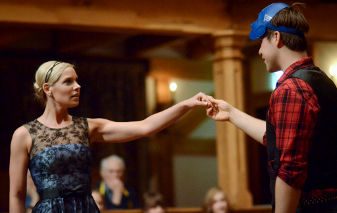
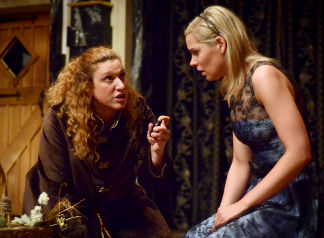
Allison Glenzer has similar success as Friar Lawrence, an unapologetically long-haired Father with the heart of a hippie, sitting on the edge of the stage 2.3, her feet dangling, as Paul's Romeo playfully sneaks up behind her. When she notices Romeo has not been to bed, she elbow-nudges an audience member in a Gallant's Stool, and her cry of "Holy St. Francis!" at his passion for a Capulet draws hearty laughter. Before the 2.6 nuptials, the lovers take hold of each other's hands and kiss, and when the kisses become passionate, Glenzer's Friar needs to step between them to get them apart. As good as Curns and Glenzer are, and they certainly enliven the narrative, it is with this chemistry between Paul and Thomason that beats the heart of the production. They are genuinely affectionate, their passion realistic if overflowing with youth, Paul's Romeo fetal 3.3 and inconsolable at his banishment - "heaven is here where Juliet lives" - only rising and wiping away tears at the prospect of meeting with her. When Glenzer's Friar offers him her hand, Romeo instead embraces her, and good-daughter Juliet - after a 3.5 wedding night with her hair down, wearing Romeo's Montague-red undershirt - moves from schoolgirl puppy-love to womanly resolve: "I will not marry yet." She proves real her claim to Curns's Nurse - "if all else fails, myself have power to die" - in 4.3, upon her bed rolled in from upstage, risking all with the potion from the Friar: "Romeo, I come, this do I drink to thee."
The musical interlude that serves as intermission, if for the audience and not the performers, includes more contemporary popular music with thematic insight, from Katy Perry's "Teenage Dream - "don't ever look back" - to "It's Too Darn Hot" from Cole Porter's Kiss Me, Kate, which includes the whole cast removing their hats, gasping, and fanning themselves: "I'd like to meet with my baby tonight." The song segues nicely into Benvolio's 3.1 "the day is hot" comment in the market with Mercutio. Gregory Jon Phelps plays Mercutio as more than just a wise-cracking sidekick - vigorously trading sword swipes with Benvolio - adding an edge of irreverence and vulgarity to the usual angry danger that counters Paul's boyish Romeo. Phelps's long-haired Mercutio wears a purple shirt and tie along with a gray vest - color schemed somewhere between Capulet and Montague - with black pants and boots. He breaks wind 1.4 on Benvolio, and 2.2 he sighs booze-breath into the face of the apparently amused Lord Capulet before racing off with the sound effect of a flying super-hero Iron Man, his visor down, his arms outstretched. During 2.4, Paul's Romeo must literally push him away from harassing the Nurse, and his mercurial temper flares 3.1, when he slaps Romeo for embracing the hated Tybalt, then meows a challenge to the prince of cats. Once wounded, Mercutio's curse is anguished - "a plague o' both your houses" - and when he falls, Paul's Romeo dashes headlong across the stage and slides to his friend's aid. Romeo's wrath apparently exceeds his familial loyalty, and he dispatches Tybalt with a murderous anger, stabbing him repeatedly with a dagger after felling him with his sword.
Warren limits the moments of humor in the second half - Romeo shocked at coming suddenly face to face with Curns's Nurse 3.5 on the balcony; Peter hanging his head with an "oh no" expression 4.2 at more invitations to deliver - and the mood becomes irrevocably downcast, from Romeo's soft-spoken realization ("o, I am fortune's fool") to Juliet cowering on her knees before her raging father. After the Nurse discovers the apparent suicide 4.5, Juliet's arm falling limply from her bed, Warren accelerates the pace, racing from Glenzer's Lawrence silently mouthing a prayer to Romeo turning on his knees 5.1 to find the Apothecary silhouetted in the doorway window, past Father John's insipid 5.2 failures to deliver letters, to Capulet entombing Juliet 5.3 on a slab downstage right.
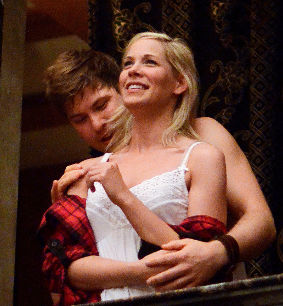
Warren's focus is tightly and rightly on Juliet and Romeo, and Paul's Romeo sprawls backward when confronted by Paris, then spears his erstwhile rival to the wooden door with his sword. When he sees Juliet, he gasps and covers his mouth, and time seems to stop as Paul's Romeo eases himself onto the bier, takes his poison, then embraces his wife and kisses her one last time - "thus with a kiss I die" - before shuddering and lying still. Thomason's Juliet has a similarly touching moment, crying out at the sight of Romeo (and somehow scaring the Friar from the tomb), then trying to drink the poison - "no friendly drop" - before finding a knife ("o happy dagger") and stabbing herself in the side: "their rust, and let me die." When Thomason's Juliet falls, she sprawls across Romeo's back like a cross. The final moments are brief but emotional, Montague so bereaved (also with the loss of his wife) that Lord Capulet forgets the feud - "brother Montague, take my hand" - and the Prince ends the production with his words from the top of the crypt's stairs: "never was a tale of more woe."